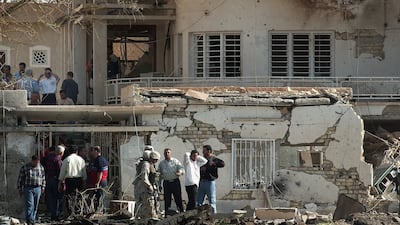When Nadia Gattan first landed in London from war-torn Iraq in March 2004, she remembers being struck by the silence on the streets.
“When I got to London, I was like wow, it’s so quiet,” she said.
Until then, Gattan had spent her life in Baghdad and witnessed the fallout from the Iraq war in 2003, when a US-led coalition invaded Iraq to overthrow the government of Saddam Hussein. “Iraq was in a state of freefall. I had struggled to get a passport,” she said.
Before leaving, a series of suicide bombings targeted her offices at the International Committee of the Red Cross headquarters in Baghdad. “We were walking in our own colleagues' pools of blood,” she said.
Gattan arrived in the UK as a tourist, but when the violence continued to escalate in her home city, she decided not to go back. She obtained a work visa and has lived in the UK ever since. “All my tangible memories stayed in Baghdad,” she said.
Today, Gattan is among the tens of thousands of Iraqi-born residents in the UK. Yet 20 years on her memories of the Iraq war conjure mixed feelings.
Gattan recalled the days and weeks after Saddam’s capture. “We were so happy. We had grown up in a blackout. We didn’t know what was going on outside of Iraq, beyond what was reported in state media,” she said. Before the invasion, Iraqis had lived through the Iran-Iraq war and a UN embargo which isolated the country.
But the moment of hope was short-lived. “And then everything broke down,” she said. A surge in sectarian violence, threats from armed groups, and a collapse of the country’s institutions compelled Iraqis like Gattan to flee.
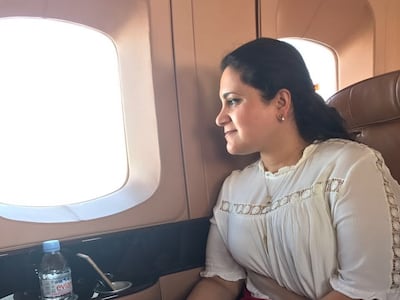
Many Iraqis in the UK echo a similar sense of disappointment.
“People were happy that Saddam was gone,” said Ahmed Agha, a resident of north London, who was a teenager during the 2003 invasion. “But the chaos and corruption that followed hasn’t changed. So many children live in poverty.”
Agha left Iraq in 2017. He had served as a relief worker during ISIS’s occupation of Mosul in 2014, making two dangerous journeys to Mount Sinjar. After the war, repeated threats from government-backed militias caused him to flee.
He came to the UK illegally, spending months in government accommodation for asylum seekers. “I did not feel safe going to Germany or other parts of Europe, as I knew that former militiamen had sought asylum there,” he said.
Today, he works as a cook in a local restaurant, but hopes to set up his own business.
Before the 2003 invasion, the UK served a refuge for those fleeing Saddam’s government. Shorsh Saleh, an Iraqi-Kurdish artist and teacher based in London, came to the UK in 2002. For decades, his family had been involved in the Kurdish resistance against Saddam.
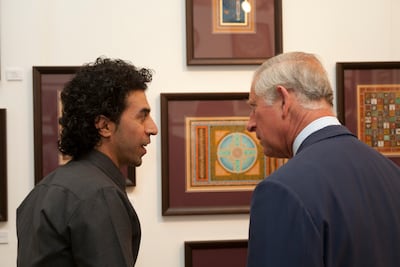
To get to the UK, he first journeyed on foot across the Kurdish mountains into Iran, and then to Turkey. “We were hiding in caves in the night. There were guerrillas hiding in the mountains, and we worried that the border guards would mistake us for fighters,” he said. “I don’t think I could make such a journey again.”
Today, Saleh teaches carpet weaving at the Prince's Foundation School of Traditional Arts and has produced work about the Iraq war and its legacy.
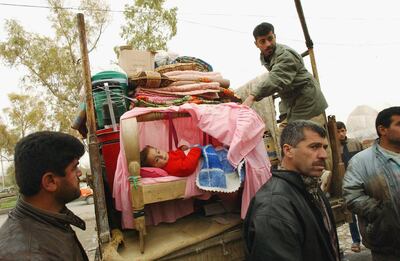
Yet despite his Kurdish heritage, the past 20 years have left him with more questions than answers. “We thought we would have a brighter future after Saddam, but the country seems to be getting worse,” he said. “The Kurdistan Region did well after Saddam was gone, but the rest of Iraq did not.”
Emad Al Ibady, co-founder of the Iraqi Welfare Association, a UK charity that supports Iraqi refugees, said that many Iraqi exiles in the UK returned after the 2003 invasion — only to have their dreams thwarted by the ensuing chaos.
“They had hope that Iraq would be a better place,” he said. “But the Americans and the West mismanaged the war and created fatal errors and mistakes. A lot of people then changed their minds, they said Iraq is not the place that we dreamt of.”
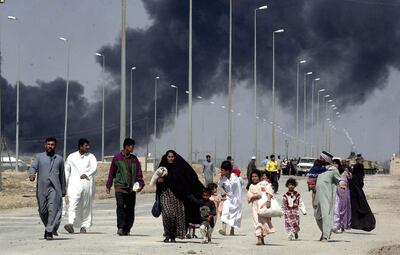
Today, families that were scattered across the globe are struggling to be reunited again. Gattan’s parents fled Iraq in 2006, first as refugees to Damascus, and are now settled in Helsinki. “But they dream of living in the UK,” she said.
More could be done, she added, to allow Iraqis into the country. “The UK has a responsibility towards Iraq’s refugees. Ukrainians were welcomed to the UK last year,” she said, referring to the Homes for Ukraine refugee sponsorship scheme. “Why is it different for Iraqis?”
The Iraq War: A Timeline of Events — In Pictures
Many also point to the brain drain caused by continuous migration out of the country. Maher Nawaf, an activist for Iraq’s Yazidi community, is a senior scientist and immunologist at the Charles River Laboratories in Bristol. He came to the UK on a government-funded scholarship in 2011.
But continuing violence and ISIS's occupation of northern Iraq prevented him from returning. “I came to finish my PhD and go back to Iraq,” he said. “We lost our property, we lost family members and friends, it was too hard to go back.”
“Any Iraqi who is given the option would leave Iraq,” said Nawaf, who supports Yazidi families with their asylum applications to the UK. Since 2014, he said, about 30 Yazidi families have resettled in the UK.
The continuing exodus is not a solution, however. “We don’t want to bring all Iraqis to the UK,” he said.
Instead, he hopes that support from the international community can make Iraq a better place to live. “The international community has a duty to offer a safe place for Iraqis to live in Iraq. They could change the political system, and stop neighbours from intervening, so that Iraqis can go back and build a great country.”
